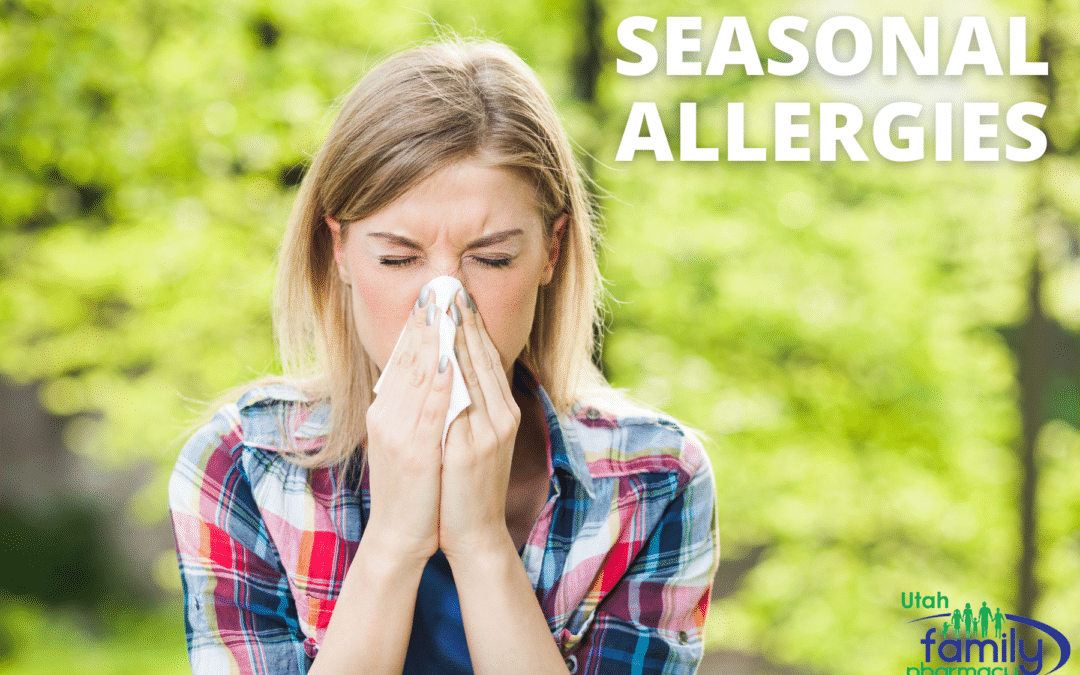With the new seasons, comes seasonal allergies. Especially when spring flowers start to bloom and trees are gaining their leaves back.
If you’re part of the population who suffers from seasonal allergies, this time of year can be especially miserable. From heavy congestion, to sneezing and a constant runny nose, the symptoms seem endless.
Before locking yourself indoors, or avoiding all contact with nature, let’s go over some helpful tips and tricks to keeping your seasonal allergies at bay.
Monitor Your Exposure to Allergens
When you know the spring plants are in bloom, or there may be possible triggers to your seasonal allergies present, it’s a good idea to avoid them when possible.
This can be done by carefully monitoring what’s going on outdoors that may trigger extreme allergy symptoms.
To reduce allergen exposure, you can:
- Watch the weather. If there’s reported high winds, or it’s extra dry outside it may be best to stay inside that day. The best time to plan an outdoor activity is after there’s been rain. Rain is a natural shower that helps pollen clear from the air.
- Get a personal lawn mower. If you’re someone who suffers from seasonal allergies, things like mowing the lawn may not be for you. It can stir up a lot of allergens from the grass and weeds. Triggering allergy symptoms.
- Execute damage control. If you know you’ve been outside and potentially exposed to allergens like pollen, it’s a good idea to quickly act. Especially before entering your home, you should change your clothes and shower off when you enter.
- Dry your laundry indoors. Hanging clothes and bedding outside to dry after washing is a convenient way to save energy, but it’s not a safe tactic for those with seasonal allergies. Pollen can stick to the fabric and carry allergens indoors.
- Wear a pollen mask. Technology is a great thing! If you’re someone with seasonal allergies who loves to be outdoors, whether to hike or do chores, there’s such thing as a pollen mask that can allow you to do all those things without getting triggered by allergens.
Keep an Eye on Pollen Count
The symptoms that come with seasonal allergies grow especially worse when there’s a high count of pollen in the air.
To help avoid exposure when the count is high, there’s several resources available to check the pollen count before being outside.
To help reduce your pollen exposure:
- Check your local forecast. There should be either a TV, radio station, or newspaper that reports the pollen count. Though the quickest way is probably to look it up on the internet before leaving the house.
- If you’ve checked the forecast and the pollen count is going to be high, but you still need to go outdoors, we recommend taking allergy medication before you start experiencing symptoms.
- Make sure your house is a pollen free space. Meaning if the pollen is high, ensure all of your doors and windows are properly closed.
- Pollen count is known to be higher during the morning, so we suggest avoiding any outdoor activities until later in the day.
Keep Indoors Allergen Free
When it comes to keeping your home allergen free, there’s no product that can clean the air from them.
Though the following steps may help avoid keeping allergens in your home:
- Keep air conditioning on when indoors, whether your house or car.
- If your home has forced air systems, make sure you’re using efficient air filters and have maintenance performed regularly.
- For allergies, dry air seems to help indoors, so invest in a dehumidifier.
- When cleaning your home, use allergen friendly products, like a vacuum that has a HEPA filter.
Visit Your Local Pharmacy
When it comes to treating seasonal allergies, few things can help more than allergy medications can.
You should visit your local pharmacy and get their assistance in finding the right over the counter medications that will help relieve some of your seasonal allergy symptoms.
These medications include:
- Oral antihistamines. An antihistamine is what’s used to help alleviate itching, sneezing, watery eyes, or a runny nose. Some examples include things like Claritin, Zyrtec, or Allegra.
- Decongestants. These decongestants for allergies are commonly taken orally. Products like Sudafed, or Afrinol can help to relieve any stuffiness in your nose. Decongestants also come in the form of nasal sprays, like Afrin. These should only be used periodically when needed, as they can worsen symptoms if overused.
- Combination Medications. There are allergy medications that have both an antihistamine and a decongestant. Common examples of these are Claritin-D, or Allegra-D.
- Nasal Spray. Nasal spray, or cromolyn sodium, is used to relieve allergy symptoms, but is most effective if used before symptoms begin.
You should always consult with your local pharmacist before choosing an allergy medication that’s right for you.
Rinse Your Nasal Passages
With seasonal allergies, commonly comes nasal congestion. Rinsing the nasal passages by performing nasal irrigation is a common way to relieve this congestion.
It’s an inexpensive and fast acting relief for those suffering from their allergy symptoms. It works by immediately clearing the passage of mucus and other allergens.
The most common product that you can use to perform this is a neti pot. A neti pot is a small container that has a spout made to rinse your nasal passages. You should be able to find a net pot at your local pharmacy.
You then use it by first ensuring that you have distilled and sterile water. It can either be first spoiled, or filtered with the proper amount needed for a saline irrigation solution.
The instructions for use should be on the package, or can be found online.
You should also ensure that you properly rinse out the neti pot before and after each use. This should be done with a sterile solution. Allow it to air dry.
Alternative Treatments
When it comes to treating the symptoms of seasonal allergies, there are a lot of alternative treatments available.
These can include herbal extracts, or other natural supplements being used. Though an expert should always be consulted first.
There are some who even believe that acupuncture can help relieve their seasonal allergy symptoms.
Always talk to your doctor or pharmacist before trying alternative treatments for seasonal allergies.
See the Experts for Your Seasonal Allergies
If what you’re doing on your own to treat your seasonal allergies isn’t bringing you relief, you should consult with your doctor or pharmacist.
By taking the proper steps to avoid possible allergens and taking over the counter medications for your symptoms, you’re doing all of the right things. For some this may not be enough, or maybe they’re not taking the proper medications for their symptoms.
If you’re someone who suffers from seasonal allergies, there are other things your doctor may be able to do. Like skin, or blood tests to figure out what exact allergens are worsening your symptoms.
These tests can help you figure out what triggers your allergies, as well as give you options for prescription medications that may also help relieve your symptoms.
There’s even options for allergy shots, or other treatment options that your doctor may be able to work with your local pharmacist to figure out. You don’t have to suffer with the symptoms of seasonal allergies forever!


Recent Comments